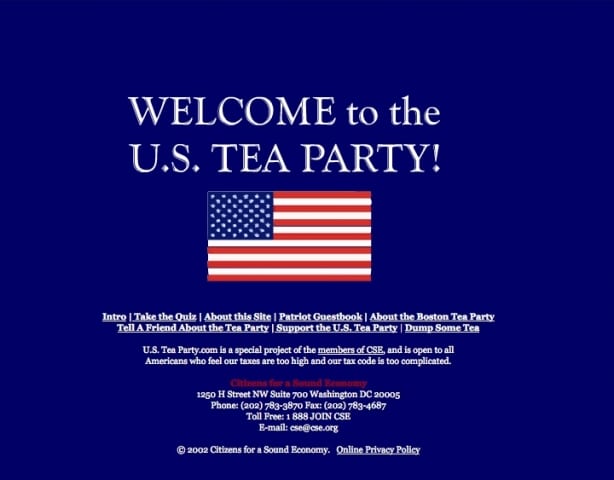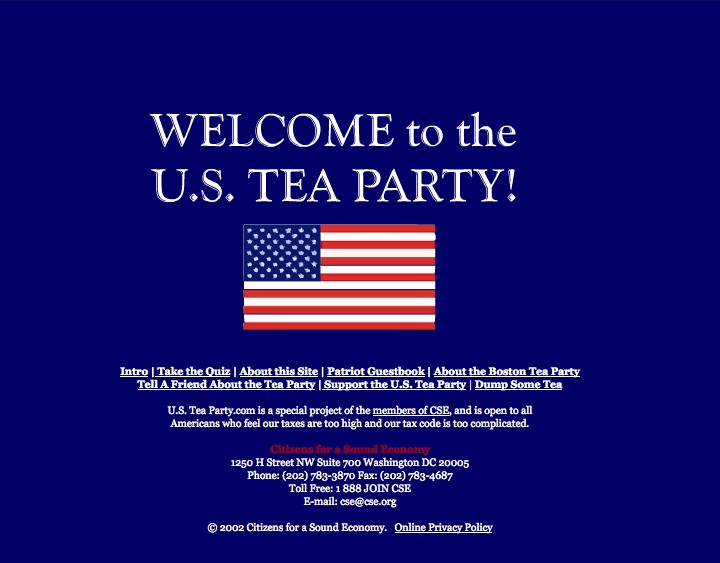A new academic study confirms that front groups with longstanding ties to the tobacco industry and the billionaire Koch brothers planned the formation of the Tea Party movement more than a decade before it exploded onto the U.S. political scene.
Far from a genuine grassroots uprising, this astroturf effort was curated by wealthy industrialists years in advance. Many of the anti-science operatives who defended cigarettes are currently deploying their tobacco-inspired playbook internationally to evade accountability for the fossil fuel industry’s role in driving climate disruption.
The study, funded by the National Cancer Institute of the National Institute of Health, traces the roots of the Tea Party’s anti-tax movement back to the early 1980s when tobacco companies began to invest in third party groups to fight excise taxes on cigarettes, as well as health studies finding a link between cancer and secondhand cigarette smoke.
Published in the peer-reviewed academic journal, Tobacco Control, the study titled, ‘To quarterback behind the scenes, third party efforts’: the tobacco industry and the Tea Party, is not just an historical account of activities in a bygone era. As senior author, Stanton Glantz, a University of California, San Francisco (UCSF) professor of medicine, writes:
“Nonprofit organizations associated with the Tea Party have longstanding ties to tobacco companies, and continue to advocate on behalf of the tobacco industry’s anti-tax, anti-regulation agenda.”
The two main organizations identified in the UCSF Quarterback study are Americans for Prosperity and Freedomworks. Both groups are now “supporting the tobacco companies’ political agenda by mobilizing local Tea Party opposition to tobacco taxes and smoke-free laws.” Freedomworks and Americans for Prosperity were once a single organization called Citizens for a Sound Economy (CSE). CSE was founded in 1984 by the infamous Koch Brothers, David and Charles Koch, and received over $5.3 million from tobacco companies, mainly Philip Morris, between 1991 and 2004.
In 1990, Tim Hyde, RJR Tobacco’s head of national field operations, in an eerily similar description of the Tea Party today, explained why groups like CSE were important to the tobacco industry’s fight against government regulation. Hyde wrote:
“… coalition building should proceed along two tracks: a) a grassroots organizational and largely local track,; b) and a national, intellectual track within the DC-New York corridor. Ultimately, we are talking about a “movement,” a national effort to change the way people think about government’s (and big business) role in our lives. Any such effort requires an intellectual foundation – a set of theoretical and ideological arguments on its behalf.”
The common public understanding of the origins of the Tea Party is that it is a popular grassroots uprising that began with anti-tax protests in 2009.
However, the Quarterback study reveals that in 2002, the Kochs and tobacco-backed CSE designed and made public the first Tea Party Movement website under the web address www.usteaparty.com. Here’s a screenshot of the archived U.S. Tea Party site, as it appeared online on Sept. 13, 2002:
CSE describes the U.S. Tea Party site, “In 2002, our U.S. Tea Party is a national event, hosted continuously online, and open to all Americans who feel our taxes are too high and the tax code is too complicated.” The site features a “Patriot Guest book” where supporters can write a message of support for CSE and the U.S. Tea Party movement.
Sometime around September 2011, the U.S. Tea Party site was taken offline. According to the DNS registry, the web address www.usteaparty.com is currently owned by Freedomworks.
The implications of the UCSF Quarterback report are widespread. The main concern expressed by the authors lies in what they see happening overseas as the Tea Party movement expands internationally, training activists in 30 countries including Israel, Georgia, Japan and Serbia.
As the authors explain:
“This international expansion makes it likely that Tea Party organizations will be mounting opposition to tobacco control (and other health) policies as they have done in the USA.”
Freedomworks and Americans for Prosperity are both multi-issue organizations that have expanded their battles to include other policies they see as threats to the free market principles they claim to defend, namely fighting health care reform and regulations on global warming pollution. The report’s warning about overseas expansion efforts by Freedomworks should therefore also be heeded by groups in the health and environment arenas.
Finally, this report might serve as a wake-up call to some people in the Tea Party itself, who would find it a little disturbing that the “grassroots” movement they are so emotionally attached to, is in fact a pawn created by billionaires and large corporations with little interest in fighting for the rights of the common person, but instead using the common person to fight for their own unfettered profits.
Subscribe to our newsletter
Stay up to date with DeSmog news and alerts







